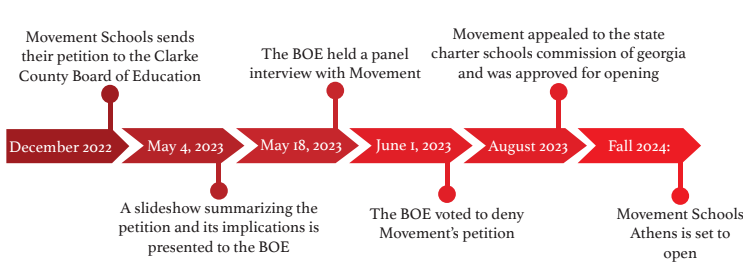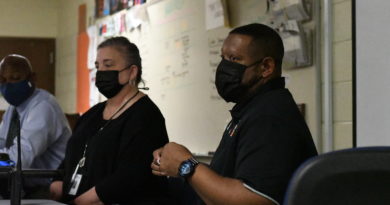Making a Movement: Charter schools come to Athens
The first charter school, City Academy in St. Paul, Minnesota, was founded in 1993 by a group of teachers. 31 years later, close to 8,000 charter schools in 43 states educate children of all grade levels, socioeconomic conditions and races.
Jeff Bryant, a writing fellow at the Independent Media Institute who has been covering the education beat since 2011, describes charter schools in this way:
“A charter school is an organization that is set up usually by a nonprofit board to apply for and receive a contract from the state or a local school board,” Bryant said. “They are privately run schools that get public money.”
Any charter school that wants to be established in the state of Georgia must first send a petition to the school system in which they would like to operate. That’s what Movement Schools (MS), a Charlotte-based charter school company with seven locations across North Carolina, sent to Clarke County School district on May 4, 2023. The petition outlined MS’ vision for Movement School Athens (MSA), an independently run elementary charter school that they wanted to establish in CCSD.
The basic premise of a charter school was conceptualized by University of Massachusetts education professor Ray Budde. His idea was that a school would obtain a contract (or “charter”) with the local school district which, in exchange for the expectation of higher test scores, grants them increased control over their curriculum. Charter schools are allowed to develop alternative methods of teaching students with little to no oversight from outside regulating bodies, such as school boards or state governments. Charter schools are also often run by private organizations.
James Price, an assistant principal at Cedar Shoals, worked in four charter schools in a variety of positions for nine years before joining CCSD. He describes his experience with charter schools positively, pointing out the benefits of working outside a traditional school district.
“You’re able to think outside the box. I love the luxury that I had working in a charter school. I didn’t have to follow a scripted lesson plan, which was always great,” Price said.
The CCSD Board of Education reviewed MS’ petition and, after a Q&A with the company, eventually denied it. James Barlament, the executive director of innovation, strategy and governance for CCSD, gave reason for the board’s rejection.
“Movement Charter Schools has a long-range plan to expand to 100 charter schools within the next 10 years, and Athens will be one of those,” Barlament said. “Part of our concern was the expansion model. We had a lot of questions in our interview about that type of aggressive expansion.”
Another reason the board rejected the proposition is the relatively poor performance of schools within the Movement network. According to a report made by CCSD to present to the BOE, the only Movement charter school to report data performs worse than both the state of North Carolina and the local school district, Charlotte-Mecklenburg.
“Their track record did not lead us to believe that students of Clarke County and the surrounding area could receive a better education at a Movement charter school than they could at a CCSD school,” Barlament said.
The board also cited other reasons for the denial in their official recommendation , such as a lack of an arts education and the lack of oversight that would be allowed by the district.
After getting denied by the CCSD BOE, MS took the next option available to them by applying to the State Charter Schools Commission. After conducting interviews, the SCSC eventually approved the establishment of MSA in Clarke County.
Georgia charter schools all fall into one of two categories: school district approved or SCSC approved. This seemingly minor distinction carries significant ramifications for the way that MSA will operate. When CCSD denied the petition, they gave up any oversight or control they might have had over MSA.
“They’re (MSA) essentially part of a state network of charter schools that is quickly expanding,” Barlament said. “I don’t know how our relationship with Movement charter schools is going to be. We haven’t spoken to them since they were approved by the state.”

MS is funded in part by Movement Mortgage, a Charlotte-based mortgage company founded by former Carolina Panthers tight end Casey Crawford. Movement Mortgage puts some of the profit derived from their business into the Movement Foundation, which then funds Movement Schools. Movement Schools is headed by Kerri-Anne Thomas, the owner of the Atlanta branch of Brooklyn Tea, an artisan tea shop. Thomas, Movement Mortgage, and Movement Schools did not respond to multiple requests for comment.
The buildings and land that serve as Movement Charter school campuses are owned by Movement Mortgage, raising concerns that Movement Mortgage is using Movement Charter as a money-making operation. In the current plan for MSA, the school district would pay Movement Morgage Movement Mortgage also has other profit making mechanisms from the charter schools. For example, the custom monogrammed uniforms that all students at movement charter schools are required to wear are only available for purchase on the movement school website, or through a partnering uniform distributor. When the CCSD BOE questioned the possibility that MS is profit oriented, MS asserted that all profits from the charter schools would go back into the Movement Foundation.
Charter schools, especially ones located in impoverished communities, have been documented to lose funding and subsequently close at alarming rates. According to the network for public education over 850,000 students were displaced due to the closure of a charter school between 1999 and 2017. Lacking the support from a local district that public schools have, charter schools will often close if they run out of finances or fail to recruit a large enough student body. When questioned about this possibility by the BOE, Movement cited their expansive base of funding that would ensure that they would be able to bail out any of their charter schools on the brink of financial failure.
Because MSA was approved by the state level commission, they are a member of a statewide network of schools overseen by the Georgia State Charter School Commission (SCSC), who also did not respond to a request for comment. This means that CCSD will have no form of oversight or control over MSA. Bryant foresees a problem that might arise from CCSD lacking any control over MSA.
“The district can’t conduct an audit of the school to see if it is serving the same population of students as the other schools in this district,” Bryant said.
In place of a local school district, the board that oversees all Movement Charter schools will govern MSA. Led by a CEO and CFO, the board’s structure is reminiscent of a business. On MS’ website, board meetings are described as “primarily business,” although community members (parents who have children at Movement) are allowed to ask questions. Day to day school level operations involve a principal and vice principal hired by MSA.
Lakeisha Gantt, CCSD BOE member (District 7), believes that schools are better served when the local district performs oversight.
“If you live in a town or you live in a state you sort of want that oversight to be people who are grounded in that community, who know that community, who know the nuances, who understand the challenges,” Gantt said.
Bertis Downs, former legal advisor and manager for rock band R.E.M. and public education advocate, believes that the lack of local connection between a community and a charter school can prove especially problematic when a child is facing a learning issue.
“(At a public school) You can find the right adult and ask them to help you understand why this is going on this way,” Downs said. “At charter schools it’s kind of like trying to get customer service on the phone. And that’s not as optimal to me as knowing that there’s an on the ground accountability, somebody who you can look in the eye.”
Funding for public schools in the state of Georgia is governed by the Quality Basic Education (QBE) act of 1985. The amount of QBE funding, which comes from the state government, that each school receives is calculated based on the number of Full Time Equivalent students (FTEs) enrolled and what programs (gifted, special education, etc.) they are in. Funding is then calculated based on the grade level of the student. The rest of the funding for schools comes from local property taxes. Since it is part of the state charter school network, MSA will not receive any money from property taxes in Athens-Clarke County. Rather, it will be funded by the SCSC using its own funding formula. But for every student that leaves to go to MSA, CCSD will lose that students’ FTE funds.
In its first year MSA plans to enroll 104 students in kindergarten and 30 students in third grade, with future plans to add a kindergarten class every year until the school becomes a K-5 elementary school. Currently, Georgia public schools receive roughly $4,679.10 per kindergarten student, and roughly $3,618.20 per third grader. This means that in its first year, if MSA reaches its student population goals, CCSD will not receive $595,172.40 in FTE funds that would have stayed in the district had MSA not been established here. Movement will not provide a pre-K, whose students do not receive FTE funding.
This funding loss will come on the heels of a gradual decline in student population in CCSD.
“Our (CCSD’s) state funded FTE has gone down significantly since a peak of about 14,000 students back in 2018,” Barlament said.
The fact that charter schools draw money away from school districts is one of the most contentious parts of their existence. Bryant points out the importance of funds that are lost to charter schools, and the impact that the loss can have on public schools.
“What happens is the school is left with less money to run programs, which often leads to the school having to cut an extracurricular (such as band),” Bryant said.
Movement Charter schools market themselves primarily to low income, racial minority families. Movement Schools are usually located in low income areas, and on their website, Movement charter promises to “address issues that afflict communities such as poverty.” MSAs’ educational model might prove promising to residents of Athens Clarke County in comparison to their local elementary school, as CCSD routinely underperforms the state in standardized test performance. Downs, however, is not convinced.
“A lot of it is marketing,” Downs said. “The best marketing campaign for charter or private schools is ‘your (non-charter) schools suck.’”
Bryant offered another reason that students might leave traditional schools: that parents feel that state level changes to the education system pose a threat to the education their children receive.
In 2022, the Georgia state legislature banned the teaching of critical race theory in all public schools.
“Where they can see when a state legislature is working against the interest of their children. For instance, you had the situation in Florida, where the governor was openly opposed to teaching the truth of American history,” Bryant said
CCSD will be looking to keep students and the FTE funds they bring in the school district. Gantt believes that the presence of charter schools and other competing forms of education, such as private schools and home study, will make CCSD take a closer look at the way it caters to students.
“It should be a call to really focus on and hone in on being sure that students are achieving and that they are healthy and thriving,” Gantt said.
A way to achieve this is to expand the services that public schools give to the local population. A “community school” is a public school that offers goods and services far beyond education.
“The community schools model works at making the local school a hub for children and families. The school could operate a food pantry because of food insecurity problems in the neighborhood, bring in health care specialists like eye doctors to do exams or local nurses to be on staff continuously to deal with student health problems, counselors for mental health care, making the school a hub for all those kinds of different kinds of services,” Bryant said
MSA will begin operations in the fall of 2024, according to their website. And they might not be the last charter school to set up shop in Athens Clarke county. Barlament said that the district received another petition from a charter school recently.
“I think that we’re probably going to be answering at least one charter school application per year, at least for the foreseeable future,” Barlament said.




